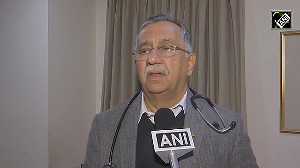The GST Bill, seen as single biggest tax reform in a long time, needs to be ratified by at least 15 state legislatures before the President can notify the GST Council which will decide the new tax rate and other issues

The Assam Assembly unanimously ratified the Constitution Amendment Bill on GST on Friday, becoming the first state to do so.
"I declare the Bill, which was passed by both Houses of Parliament, to be ratified unanimously by Assam Assembly," speaker Ranjeet Kumar Dass announced in the House.
Though opposition Congress and AIUDF MLAs supported the Bill, they had earlier sought a discussion in the Assembly to evaluate GST's impact on Assam and the people. But they were turned down by the speaker.
Following ratification of the Constitution (One Hundred and Twenty Second Amendment) Bill, 2014, Dass and Finance Minister Himanta Biswa Sarma, who introduced it in the House, exchanged sweets.
Sarma said Chief Minister Sarbananda Sonowal wanted that Assam becomes the first state to pass the amendment as this would send a positive signal to the industry.
"We have always lagged behind, but want to be the first in passing this Bill. This is a historic proposal. I thank the Speaker for allowing us to introduce it today after we informed him just last night," said Sarma, who introduced the bill on behalf of the chief minister.
Sarma said after Brazil and Canada, India will be the third country in the world to collect GST by both centre and state through a new body - GST Council (GSTC).
The GST Bill, seen as single biggest tax reform in a long time, needs to be ratified by at least 15 state legislatures before the President can notify the GST Council which will decide the new tax rate and other issues.
The government has set a deadline of April, 2017 for its rollout.
Sarma said in the House that "of the central GST portion, 42 per cent tax will be given back to the state again."
The GST will also have a special concession option for NE and Himalayan states if they request reduction of taxes for any reason, he claimed.
"Besides, we can also collect special tax during natural calamities like flood if we feel the need to generate more revenue. But everything will have to be approved by the GSTC," he added.
Talking about the impact of GST on Assam, Sarma said the state is likely to incur a revenue loss of Rs 3,000 crore (Rs 30 billion) in the initial period of its rollout.
"The state cannot levy service tax as of now as it is a central duty. For the first time, we will be able to levy service tax. This will recover 2-3 per cent of our losses," he added.
The finance minister said any shortfall of tax collection compared to the existing numbers will be compensated by the Centre as grants for the next five years, taking 2016-17 as the base year.
"So, overall we will not suffer any loss. In fact, we will gain in long term. GST will be a blessing to all as both the Centre and the state will be gainer."
Sarma said 127 items, for which VAT is six per cent at this moment, will be little more expensive after GST is rolled out. "However, there are thousand other goods with VAT more than 14 per cent, those will be cheaper in future. So immediately prices of many goods will come down."
Sarma said GST will benefit consumer states more as the tax will be collected at the place where the goods have been purchased, unlike VAT which is collected at the manufacturing gates.
Assam, he said, will continue to tax all petroleum products, alcohol and tobacco products as these have been kept outside the purview of GST.
Petroleum and tobacco products have been kept outside GST for temporary period, while alcohol will never be a part of the new tax regime.
"Of our total tax collection, around 30 per cent will come from petroleum products, tobacco and alcohol, while remaining 70 per cent will be from GST.
"If there is any shortfall, it will be compensated by the Centre for the next five years," Sarma said.
Municipal councils and other local bodies will not be part of GST and will continue to collect their taxes, he added.
Photograph: Anindito Mukherjee/Reuters






 © 2025 Rediff.com -
© 2025 Rediff.com -